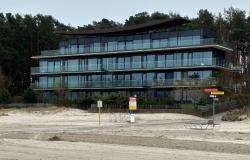At the moment, when driving to Lithuania by car, there is no toll for the roads, but this may change and a fee could be set for the use of certain roads, reports lrytas.lt.
At the moment, you have to pay for roads in the neighboring country, i.e. you have to buy a vignette only for trucks and cars with a trailer. There are currently no roads in Lithuania that all drivers without exception have to pay for, but there could be soon. You may have to open your wallet to use one of the country’s main highways, such as the Via Baltica. A similar practice is already widely used in other countries, such as Poland, Germany, the Czech Republic, Austria, etc.
Last year, the Economic Committee of the Lithuanian Seimas had loud discussions about road taxation. The chairman of the last committee, the conservative Kazis Starkevičs, said at the time that this could be one of the alternatives for improving the road infrastructure.
“We have to dare to charge for these roads. … Let’s not be afraid of it, otherwise we won’t feel the results, because the neighboring countries are doing it. And do it actively.” – the deputy said in one of the meetings.
However, the loud discussion of last autumn has quieted down a bit at the moment, although K. Starkevičs himself promised political support for it in the Seimas.
Now, in a conversation with LRT.lt, the chairman of the Economic Committee did not dare to predict when the implementation of the plan could move faster. He added that he does not think that this will happen in the current session of the Seimas. However, K. Starkevičs continues to see the need to tax some roads.
“This year, we have a bigger budget for road maintenance, but the existing infrastructure requires huge investments, is in a critical condition and needs additional funds. This is additional funding, and it would come from the fact that certain roads in the regions that could be reached by other routes could be tolled,” said Starkevich.
According to K. Starkevič, the first steps towards the implementation of the idea of toll roads have already been taken. One of the main ones is the transformation of “Via Lietuvos” (previously the Lithuanian Motorway Directorate) into a joint stock company. According to the member of the Seimas, this transformation will allow it to implement more flexible projects.
Now “Via Lietuva” can foresee certain roads that may become tolls. One of the options considered provides that the “Via Baltica” section from Kaunas to Kedaini could be tolled. This could be like the first experiment, explained K. Starkevičs and added that, in his opinion, in the future the entire section of “Via Baltica” up to the border of Latvia could become a toll road.
The member of the Seimas also reminded that the idea of implementing a pilot project by building the Zarasu bypass is not ruled out. This and similar projects could be implemented through public-private partnership (PPP).
In a comment addressed to LRT.lt, the Ministry of Transport stated that, together with “Via Lietuva”, it is analyzing the possibilities of applying this method in the development of national road infrastructure.
The Ministry of Transport of Lithuania has repeatedly stated publicly that the existing road funding is insufficient. All opportunities aimed at increasing road funding are welcome. Public-private partnership is one of the possibilities for the implementation of large road infrastructure projects.
In such a case, a long-term contract is concluded between the state and a private person, according to which it provides and finances public services and/or performs economic activity by investing in property, assuming the risks associated with it and receiving income from it, as explained in the response of the Ministry of Transport to LRT.lt. The Ministry also stated that the construction of the aforementioned Zarasi city bypass road (about 9.34 km long), which would be a section of the main highway A6 Kaunas-Zarasai-Daugpilis, would significantly improve the quality of life of the residents of the central part, as it would divert freight traffic away from the city.
On the other hand, Vice Chairman of the Economic Committee, member of the opposition faction of the Lithuanian Social Democratic Party, Gintauts Paluckas, tells the LRT.lt portal that toll roads in Lithuania are more of an ideological consideration and the object of political discussions than a legislative initiative. According to him, the bill regulating it has not been prepared at the moment.
“Such a bill has not been considered by the commission, and I highly doubt that we will ever consider it, because it is not ready.” – Gintauts Paluckas
Paluckas also points out that roads are already paid for with fuel excise and vignettes for commercial vehicles, so in his opinion, it is rather necessary to talk about other solutions, of which there are quite a few. The closest to this is the example of Poland, which envisages an infrastructure development fund that would be supervised by “Via Lietuva”. Funds would flow into this fund from three sources: European, so-called excise and vignette funds, and borrowed funds from the European Investment Bank or the European Investment and Development Bank. Similar to what the Poles do. This would essentially allow the works to be implemented at a high pace and avoid the annual budget limit.
The head of the “Lietuvas ceļi” association, Šarūnas Frolenko, believes that it would not be completely rational to develop the road infrastructure by implementing PPP projects, because there are not many suitable places for such objects. Therefore, the idea of a road tax for all drivers does not seem economically justified. According to him, in the example of Sweden, Norway or Austria, where a new road is built together with business, which shortens people’s journey by an hour or more, it is a tax until it pays off, but according to him, there is no such possibility in Lithuania. Accordingly, alternative highways would not be built. This means that PPP projects could be city bypasses or other similar solutions, but they will hardly be roads that everyone pays for, Š. Frolenko. Instead, in his opinion, it would be useful to revise the road tax rates currently applied to commercial transport in Lithuania, as well as to expand the network of toll roads for said transport.
Evaluating the idea of toll roads for all drivers, Vilnius University economist Algirds Bartkus pointed out that taxes are not only revenue in the budget, they often also influence behavior change.
“Therefore, when it comes to means of transport, the new tax measures must not only guarantee revenue in the budget, but also create an impact that contributes to the preservation of the environment and the improvement of its quality, because transport is one of the main factors that affect the quality of the environment,” he told the LRT portal .lt.
A. Bartkus believes that in this case the fuel excise tax is appropriate because it encourages money-saving drivers to drive as economically as possible. Therefore, by attaching the road tax to kilometers driven, it will equally tax drivers with different driving styles and vehicles with different fuel economy, i.e. it will create an incentive not to drive aggressively or to choose an economical vehicle.
“Without connecting the road tax with the kilometers traveled, it becomes a duplicate of the car registration tax, which is paid periodically and which does not depend on how much and how economically and ecologically the vehicle has been used.” – A. Bartkus.
Comparing excise tax and road tax, the former not only guarantees additional income for the budget, but also encourages drivers to choose more environmentally friendly and economical vehicles, as well as a more environmentally friendly and less aggressive driving style. Therefore, in order to collect additional funds in the budget and create good environmental incentives, excise taxes should be increased instead of road tax, according to the economist.
Tags: Toll roads introduced Lithuania
-





